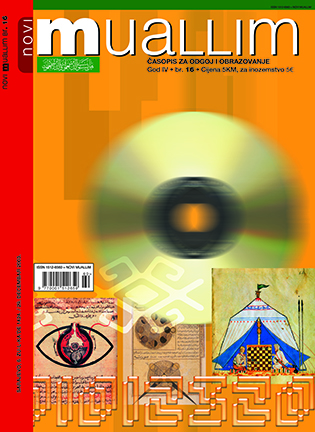THE EXPERIENCE OF RELIGIOUS EDUCATION IN THE BOSNIAN SCHOOLS
AND THE WAY OUR OWN RELIGIOUS TEXTBOOKS PORTRAY "THE OTHERS" TO THE STUDENTS IN A MULTI-RELIGIOUS COMMUNITIES
DOI:
https://doi.org/10.26340/muallim.v4i16.1535Abstract
This article analyses the content of the Islamic elementary school textbooks in the context of discourse about "the others': The purpose of these textbooks is to educate children in accordance with Islamic values, religious practice and social application of religion. These textbooks do not contain a serious consideration of the religious phenomena itself or the historic overview of development of the religious idea. Only certain aspects of monotheistic religions (Judaism and Christianity) are studied, in the context of historic development of Islamic teaching and the historic periods as set out by the Qur' an, while studying "the others" is fragmentary and casual. There is no systematic and sufficient overview of the beliefs, religious practice, culture or identity of "the others". There are very few topics on the Christians, mainly about belief in God and the holy texts. These issues are treated in the textbooks from both Islamic and Christian perspective. Jews are being talked about from the perspective of the Islamic teaching. Other doctrinal issues, or even cultural ones, are not dealt with at all.
Downloads
Published
How to Cite
Issue
Section
License
Naknada:
a. Časopis ne naplaćuje naknadu za obradu članaka (APC) i naknadu za podnošenje članaka.
Autori koji objavljuju u ovom časopisu pristaju na sljedeće uvijete:
- Autori zadržavaju autorska prava i pružaju časopisu pravo prvog objavljivanja, pri čemu će rad jednu godinu po objavljivanju biti podložan licenci Creative Commons imenovanje koja omogućuje drugima da dijele rad uz uvijet navođenja autorstva i izvornog objavljivanja u ovom časopisu.
- Autori mogu izraditi zasebne, ugovorne aranžmane za ne-ekskluzivnu distribuciju rada objavljenog u časopisu (npr. postavljanje u institucionalni repozitorij ili objavljivanje u knjizi), uz navođenje da je rad izvorno objavljen u ovom časopisu.


